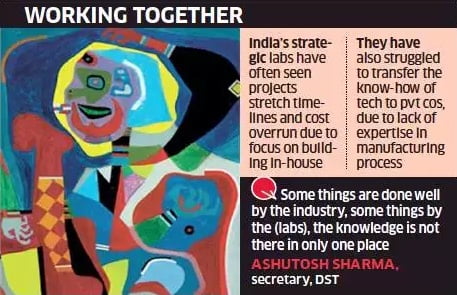Atomic, defence, space units look for collaborations with private companies
Bengaluru: India’s atomic, space and defence labs will be tasked with identifying projects that they can work on and build jointly with private companies and academia to strengthen the local innovation ecosystem, according to the draft science and technology policy released on Thursday.
The potential expertise of academics and industry will be tapped to undertake design and developments with necessary non-disclosure agreements for the benefit of the country, it said.
“This is the general philosophy of the government to encourage industry and R&D labs, academia working together. The strategic lab itself cannot be aatmanirbhar (self-reliant) if they don’t have the connection with the outside world,” Department of Science and Technology secretary Ashutosh Sharma told ET. “Some things are done well by the industry, some things by the (labs), the knowledge is not there in only one place.”
Projects by India’s strategic labs are often delayed or exceed budgets due to the focus on building technology and systems in-house. They also struggle to transfer knowhow to private companies because of their lack of expertise in the manufacturing process.
Sharma cited the example of how, during Covid-19, government labs, industry and academia collaborated to make a world-class ventilator in three months.
“The strategic lab proposes, it becomes a co-owned project and everybody brings in their expertise and builds it more effectively,” said Sharma. The policy proposes that strategic organisations have a clear plan of transferring technology for commercial applications so that startups and commercial firms can take it to the market.
“Each of these departments has a basket of products and technologies that could be commercialised. The policy is aimed at enabling the structures so that it will bring that synergy (with industry),” said Sharma.
The Indian Space Research Organisation has identified over 500 technologies it has built over the past few decades that it can commercialise and it has also unveiled a draft transfer-oftechnology policy. The policy defines how sensitive dual-use technology is to be utilised and stresses on the need for adherence to national and international laws.
Isro chairman K Sivan said last month that its technology transfer policy was aimed at making it affordable for Indian companies to take and build products and solutions.
Article: Atomic, defence, space units look for collaborations with private companies

